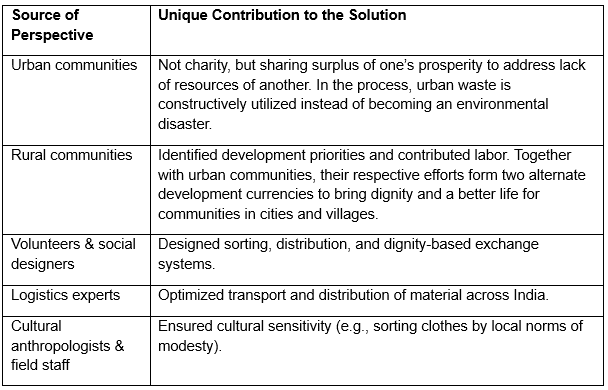In a world that has seen increasing polarization within politics and ideology, it is pertinent that leaders in non-profit organisations remain objective and solution-oriented amongst the chaos. An "if you are not with us, you are against us" mindset, has deep roots in political, social, and cultural history. However today, as the world faces interconnected global challenges, like climate crisis, social justice, and complex policy needs, such mentalities distract leaders in organisations serving social impact missions.
It has long been established that effective governance lays at the bedrock of any successful organisation. Particularly in recent years, the adoption of Environment, Social, Governance (ESG) principles and standards within the Boardroom has emphasized on the competitive advantage that diversity can bring to the mission. However, diversity need not only be synonymous with age, gender, or ethnicity.
Diversity of thought, also called cognitive diversity, encompasses the unique personalities, worldviews and experiences that drive ethical efficiency, and that each individual brings to the Boardroom. Issues like climate action and sustainable development demand inclusive, multi-stakeholder approaches where diverse opinions and collaborative efforts are necessary.
Ethical efficiency is the bridge between intention and impact, a concept of optimizing processes and systems while simultaneously upholding ethical values and principles. It involves ensuring that the pursuit of efficiency and impact aligns with considerations of fairness, sustainability, and human well-being.
Diversity of Thought as a Competitive Advantage
In the traditional view, efficiency is about streamlining – removing complexity. Yet some of the most efficient outcomes emerge precisely because of complexity – because a variety of viewpoints helped force critical thinking. It can lead to uncovering risks earlier on or sparking unexpected innovations in service or process delivery. Research has shown that cognitively diverse teams solve problems faster and make better decisions by:
• Identifying blind spots before they become crises
• Generating more creative and effective solutions
• Serving broader, more diverse communities with authenticity.
In the context of the Board, diversity of thought and ethical efficiency ensures different perspectives and voices are empowered to be heard, however that decisions are made based on merit and measurable value. When trickled down to the rest of the organisation, diversity of thought has been known to attract and retain top talent by making employees inputs feel heard and valued.
Effective modern leadership needs to rely on empathy, flexibility, and coalition, not exclusion. A successful example of diversity of thought that personally inspires me, is Goonj (India)
Social challenges addressed:
• Rural communities needed basic infrastructure (e.g. bridges, schools, roads), but lacked access and voice.
• Untapped potential of the circular economy – materials, people, relationships, talents and resources.
• The distorted lens that aid models use, generally snatches the dignity of the community it is meant to serve, as it tends to sell poverty to end poverty.
Diversity of thought: Disrupts the donor - beneficiary power structure to one that creates an ecosystem, where each stakeholder has equal value. Away from the ‘donors empowering rural poor’, to all stakeholders as equal participants of an ecosystem that is people oriented at all levels and not constrained by processes designed with a distorted lens of ‘rural empowerment’.

Competitive advantage achieved:
• Community-Driven Prioritization enabled solutions to reflect local knowledge and urgency, making projects more relevant and better adopted than externally imposed solutions.
• Redefining ‘Waste’ as a Resource transformed perceptions across class lines – engaging both sides in the value chain emotionally and practically.
• Cultural Intelligence in Distribution enabled materials to be sorted based on regional clothing norms, avoiding friction and building cultural trust.
Who do you have on your Board, subcommittees, management team, staff , collaborators and volunteers who are helping the organisation dismantle outdated views of social-impact?
The Pitfalls of Groupthink
Groupthink, or tribalism, is a psychological phenomenon wherein the desire for conformity within a group results in irrational or dysfunctional decision-making. I find it quite ironic (and a bit amusing) that people who see themselves as passionate defenders of liberty often struggle to tolerate opposing views. Despite championing freedom, they react emotionally or aggressively when others present interpretations that does not match their world view. Such dynamics can derail a Board from its intended mission and undermine its ability to govern effectively and keep with the times.
As opposed to a binary worldview that frames all individuals and situations as either allies or adversaries, leaders should embrace being challenged by contrary views for how it could inform or refine decisions taken. So long as there is open communication and a tone of mutual respect amongst the Board, mission-focused decision-making should prevail over decisions that may be ego-driven, or based on personal ideologies and geopolitical affiliations.
Geo-political disruptions: The abrupt and disastrous suspension and termination of USAID funding has been an inflection point for many social purpose organizations whose boards neglected or refused to review their financial sustainability. As a result, many NGOs had to cease operations because they could not secure alternative support or adapt their programs. These developments demonstrate a lack of agility and long-term strategic planning. Some agencies had to close 100% of their programs overnight.
While the mission of many of these organizations was to build resilience within the communities they seek to serve, the organizations themselves failed to focus on anticipatory action and become future-ready. Dependence on single or limited funding sources such as international aid, have left these NGOs vulnerable to external shocks. Their failure to innovate and diversify donors rendered them unsustainable during funding crises, including during previous crisis like the Covid-19 global lockdown.
Policy related disruption: The advocacy work by think-tanks, social service organisations, NGOs and the communities they serve are seeing results as many governments have begun to enact broad, inclusive policies addressing social protection, health, and rights of marginalized groups. Major expansion of social protection systems, including cash transfers, pension schemes, disability allowances, and integration with social services, demonstrates the pivotal role that government policy can play in building lasting systems for community resilience. Failure to forecast regulatory or social changes leads to irrelevance of some of the advocacy and capability building organisations, as the environment evolves.
Hence the agility in mission, operations and the resourcing of it, such as diversifying support, adjusting program delivery, and updating advocacy methods, is crucial for both mission and survival, as protection gaps still exists in the communities. Indian NGOs' journey towards localisation of resource mobilisation and self-reliance has shown that it can be done.
Even in the corporate sector, there are many examples of the consequences of groupthink. Intel, once the biggest and most valuable chip maker, missed the mobile chip boom and again now the AI developments. Another example is Nokia’s failure to adapt to the smartphone era despite being a company from Finland, a nation widely recognised as a highly innovative country, with an ecosystem supporting it.
• What happened: Nokia dominated the mobile phone market in the early 2000s but failed to respond effectively to upgrade its technology. Despite having early touchscreen and smartphone technology, Nokia clung to its outdated operating system and delayed bold innovation out of complacency.
• Groupthink evidence: A culture of fear prevented employees from sharing bad news with leadership. Executives were overly confident in Nokia’s market dominance and dismissed competitive threats. Internal teams competed rather than collaborated, and dissenting voices were ignored to maintain unity and avoid internal conflict.
• Outcome: Nokia's global market share collapsed from over 50% to under 5% within a few years. Its mobile division was sold to Microsoft in 2014, marking a dramatic fall from industry leadership.
Inclusivity, cooperation, and shared responsibility:
In an era where “people, planet, and policies” are deeply interconnected and complex, the "with us or against us" or the top down ‘donor- beneficiary’ views has gone well past its ‘use by’ date. Productive change today relies on inclusivity, cooperation, and shared responsibility, rather than rigid alliances or exclusions. The challenges require engagement from many, not division into simplified camps.
Here are some questions that as leaders we could consider to encourage diversity of thoughts and negate groupthink:
• When unconventional or unpopular viewpoints are raised, especially those reflective of the communities we serve, are they welcomed and explored with rigor, or are they quickly dismissed to maintain consensus?
• In our board nominations and leadership hiring, are we considering diversity in terms of professional background, skill sets, cognitive approaches, and problem-solving styles (not just gender, age, or ethnicity)?
• Are we periodically reviewing how decisions are made by looking for patterns of conformity, missed risks, or opportunities overlooked due to groupthink?
By intentionally creating spaces where varied perspectives are not only heard but valued, boards and management teams can future-proof their missions, anticipate risks, and catalyse solutions to build ecosystems and bring about systemic changes in keeping with the times. Let us move forward with courage and conviction, recognising that impactful change is driven through collaboration, empathy, and a steadfast commitment to equitable, people centered progress.






